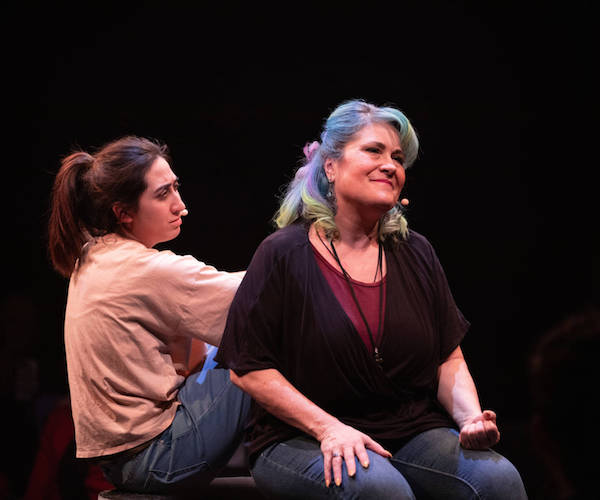Theater Review: “Miss You Like Hell” — A Lukewarm Road Trip
By Bill Marx
This is yet another sentimental exercise in the mechanics of mother/daughter rapprochement
Miss You Like Hell. Book & lyrics by Quiara Alegría Hudes. Music & lyrics by Erin McKeown. Directed by Summer L. Williams. Staged by Company One Theatre, in collaboration with American Repertory Theater at OBERON, 2 Arrow Street, Cambridge, MA, through January 27.

A scene from “Miss You Like Hell” featuring Krystal Hernandez and Johanna Carlisle-Zepeda. Photo: Evgenia Eliseeva.
The American road trip genre takes various forms on our mean streets, from existential adventures to cuddlier journeys in which domestic wounds are healed. The basic ingredients are pretty standard: vulnerable protagonists go off on a cross-country quest, sometimes chased by others and/or having to make some sort of deadline. There are a series of episodes featuring idiosyncratic characters who either shed welcome light or make matters darker. What’s surprising about the road trip musical Miss You Like Hell is just how unsurprising it is, how schematically uplifting the journey turns out to be. Despite its admirable political message about inclusion as well as huzzahs to female empowerment (“We are lionesses”), this is yet another sentimental exercise in the mechanics of mother/daughter rapprochement, hints of discomfort cast aside in the rush toward the inspirational final hug. America may be falling into warring camps and chaos but, at least on stage, family values rule.
The hit-the-road set-up: it is 2014, and 40-ish Beatriz descends upon her 16-year-old daughter, Olivia, in Philadelphia. Mom is an undocumented Mexican, panicked because she is in danger of being deported after living for decades in the United States. She has to attend a crucial hearing about her status in Los Angeles and wants the openly hostile Olivia (she was placed in the white father’s custody) to serve as a witness. They are predictably yin/yang: Beatriz may be scattered, but she is earthy, spiritual, and filled with gusto; Olivia is bookish, wedded to social media and, bowing to the time honored cliche about intellectuals, deeply depressed. Mom read a recent entry on Olivia’s blog in which she confessed she wanted to commit suicide. So the life force that is Beatriz grabs the alienated Olivia and off the odd couple go in a beat-up truck, exploring, bickering, reconciling, and singing their heads off.
There’s no question of where things are going to end up, so book writer Quiara Alegría Hudes is given a challenge: to scramble up, maybe even overturn, the usual tropes. She doesn’t, choosing to make the people that befriend Beatriz and Olivia salt-of-the-earth types; there are few creeps, mild or otherwise, in sight. Among the cheerleaders: an online contingent (Olivia’s followers) shows how dramatists can make use of social media — a text summons a warbling chorus into existence. There’s in-person help from an unconvincing pair of gay senior citizens (on a quest to get themselves hitched in every state of the union) and a sympathetic ranger at Yellowstone Park. There is also a lawyer (court-appointed?) tenaciously fighting on Beatriz’s behalf. The only not nice people are affiliated with the ‘system’ that is railroading Beatriz — a policeman and an attendant at the courthouse. (There is also a turtle who fudges things up.) The most interesting person the women run into is a sweet-tempered tamale vendor, who joins up with them. His song about cooking tamales exudes a quiet strength, a charming celebration of homegrown (and home-baked) values.
The Company One production (in collaboration with the the American Repertory Theater) is slickly directed by Summer L. Williams, though that doesn’t mean there isn’t plenty of heart on display. The performers are energetic and versatile; they take on a number of roles, and generally have fine voices. Krystal Hernandez underplays Olivia at times, and that is welcome given the insistence that musicals demand. The character’s supposed ‘despair’ vaporizes quickly, but Hernandez sings with impressive power. Johanna Carlisle-Zepeda slathers on Beatriz’s animating spirit with a trowel — a little zest goes a long way. Justin Paice’s lighting also seems a bit too attracted to the showbizzy as well.
As for the score and lyrics, there are bits (not enough) of Mexican flavoring, and I welcome the strings, but the line-up of ‘stirring’ ballads, quasi-blues, and life-enhancing anthems are all part of what has now become the formulaic soft rock-ish score, the kind of easy-listening that comforts today’s theater audiences.
Miss You Like Hell is certainly timely. The final affecting number is set at a wall that’s separating families, Olivia’s and many others. Though I wondered if the earlier off-Broadway production of the show and this presentation in Cambridge suffers from the usual problem of speaking the expected to the converted. Is anyone in the theater going to take exception to the show’s message about unjust immigration policies? Wouldn’t a more detailed look at the limitations of Obama’s reforms be more provocative? Why not a musical that isn’t about an attempt to unite a family but to build a community? A songfest that is about generating a protest movement among complacent liberals? As it is, the only places where Miss You Like Hell would be guaranteed to generate some real heat (rather than automatic nods of agreement) would be in the Red states.
Bill Marx is the editor-in-chief of The Arts Fuse. For over three decades, he has written about arts and culture for print, broadcast, and online. He has regularly reviewed theater for National Public Radio Station WBUR and The Boston Globe. He created and edited WBUR Online Arts, a cultural webzine that in 2004 won an Online Journalism Award for Specialty Journalism. In 2007 he created The Arts Fuse, an online magazine dedicated to covering arts and culture in Boston and throughout New England.
Tagged: American Repertory Theater, Erin McKeown, Miss You Like Hell, Oberon
